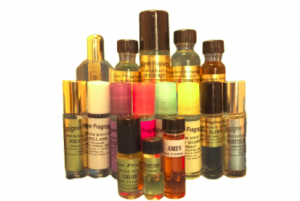Muslim Oils vs. Essential Oils
“Muslim oils” is a misnomer but it is an accurate description of how oils came to be known in the community. In the 1960s, all across U.S. urban cities, Muslim men took to the street corners or set up kiosks in small boutiques, and began selling oil fragrances, natural body oils and shea butter, as well as incense and Muslim and African attire. Muslim oils be3came the name for perfume oils with exotic names that you purchased on the street for $2 to $5. Today you can visit shops in Newark and Paterson and other cities and find all kinds of “Muslim” oils that are best for using as perfumes and incense, for a variety of reasons we’ll get to in a moment.
Let’s define “oils” in this context before we move on to essential oils. Muslim oils are not only fragrance oils or oils that can be burned for incense or used in producing incense. They include spiritual oils that can be used as fragrance oils which are known as attars. They also include body and health-enhancing oils such as argan oil and black seed oil. Along with coconut oil, these three vegetable based oils began to be known in the US as primarily for kitchen use. This was because of American’s exposure to immigrants from the Caribbean, Turkey and African and Asian Muslim countries. We’ll discuss these before we get to the attars and perfume grade oils.
Argan oil is from the Arganeraie area of Morocco and only comes from there. Culinary argan oil (argan food oil) is used for dipping bread, on couscous, salads and similar uses. Amlou, a thick brown paste with a consistency similar to peanut butter, is used locally as a bread dip. It is produced by grinding roasted almond and argan oil using stones, and then mixing the argan oil and almonds in honey. Various claims about the beneficial effects on health due to the consumption of argan oil have been made. A research article published in 2010 found that argan oil contained higher levels than other oils of γ-Tocopherol, which possesses strong chemopreventive and anti-inflammatory properties.[10] [All notes are from Wikipedia listing]
According to Wikipedia: Argan oil has become increasingly popular for cosmetic use. The number of personal-care products on the US market with argan oil as an ingredient increased from just two in 2007 to over 100 by 2011. It is also sold without additives as a natural skin- and hair-care product.
Black seed oil (Nigella sativa) has swept through the community and is now very popular. Its tiny black seeds from the cumin plant are used primarily as a spice and a traditional medicine in Asia and in the southern hemisphere all over the world. In Arabia, black seed remains a traditional remedy for asthma, coughs, stomach aches, abdominal pain, colic, general fatigue, rheumatism, mouth and larynx diseases, skin diseases, and cancer. It is also believed to strengthen a mother after childbirth; stimulate menstruation, urination and liver functions; aid digestion; dissolve kidney stones; and increase intelligence. Black seed is used to beautify skin, nourish hair and stimulate hair growth.
Preliminary studies according to Wikipedia have investigated claims from traditional medicine that N. sativa has efficacy as a therapy, mainly using the seed oil extract, volatile oil, and isolated constituent thymoquinone.[12] One meta-analysis of clinical trials found weak evidence that N. sativa has a short-term benefit on lowering systolic and diastolic blood pressure, and another found limited evidence that various extracts of black seed can reduce triglycerides and LDL and total cholesterol, while raising HDL cholesterol.[13][14]
See this youtube video
This video https://youtu.be/TBIwDBOR5SU
discusses why you should only use organicblack seed oil and recommends the two organic brands listed by the USDA: Zongle brand is certified USA organic therapeutic grade. $15.95, 4 oz. Blue Lily Organics, $15.99, 8 oz.
Coconut oil is now totally mainstream and has advocates among the most conservative food and health influencers such as Dr. Oz. The oil is a “good fat” which many fitness experts and the science says the body needs to manage itself and its proper weight. Other good fats or fatty oils are avocado oil, palm oil, fish oils, canola, peanut, hemp, sesame, and grapeseed oil. Only coconut, palm and avocado oils would make it to the “Muslim oils” list because they are sold in Muslim-culture shops alongside the blends and attars.
Today, these three oils are available widely in regular supermarkets and beauty supply stores, because each of them are high in beneficial nutrients such as vitamin E and can be ingested by the body to decrease inflammation, blockages, and skin problems. However, most of the oils in local shops clearly state on their labels that you should not ingest them. They are made with additives to increase shelf life and therefore cannot be expected to purify the body. The video warns you about expecting benefits when you cannot be sure of quality. Skin application only goes so far for certain issues, but all over the Internet these oils—argan, black seed and coconut—are recommended for internal use. Look very closely at whatever oils you want to buy.
ATTARS
For perfume oils, this warning is a nonissue. You can wear whatever your heart is drawn to, even if you will notice some perfume oil blends from the Muslim shops can be very strong. Rashes and breakout are not uncommon. This is one reason to focus on the more spiritual oils, or oils said to elevate your mind and emotions. Attars have a long history of doing just that. The guidelines for attars are looser than for therapeutic essential oils, but they are the better oils that you’ll find in the Muslim shops or being sold by street vendors.
Also known as ittar(Urdu for perfume), this form of oil was traditionally the essential oil derived from rose petals and extracted via distillation. Later, chemical means were used but generally natural perfumes which qualify as attars are distilled with water. The method distills flower petals into a wood base such as sandalwood and then lets the mixture age. The aging period can last from one to ten years depending on the results desired. Technically attars are distillates of flowers, herbs, spices and other natural materials such as baked soil over sandalwood oil/liquid paraffins using hydro distillation technique with a still and receiver vat.
Generally, however, they are usually flower oils centered in the Indian subcontinent and known as one of the oldest natural fragrant materials, nearly 5000 years old. Jasmine attar was the favorite perfume of the moguls of India. It was a customary practice of nobility to offer attars to departing guests. They would be given in ornate tiny crystal cut bottles called as itardans. This tradition of giving a scent to one’s guests continues to this day in many parts of the Eastern world. Among Sufi worshipers the use of Ittars during meditation circles and dances is quite common.
ESSENTIAL OILS
The main difference between EO and attars is that the latter are aged and more hands-on in terms of production. Whereas today’s therapy-grade oils are mass produced with an eye towards consistency and homogeneity, attars are not tested for therapeutic value. The intention is slightly different and focuses on the aromatic benefits.
It is in the aromatic realm that attars and pure, uncut essential oils are similar. In fact, the leader of essential oil knowledge, the late Gary Young, gained much of his aromatic knowledge from leading perfumers and aroma scientists in Egypt, Pakistan, Africa and Europe. The historical value of the spiritual/emotional influences of essential oils was well known by the time Mr. Young started learning about them. He added to the knowledge base by identifying and creating mechanical specifications to produce the highest and most potent values with consistency and stability of compounds, to yield the best mass-produced therapeutic EO. The Young Living company’s seed-to-seal standard has been set for all organic and quasi-organic oils producers on the market to follow.






